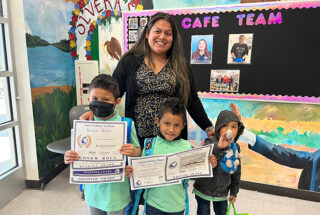
Parent’s view: Our students’ mental health isn’t about politics — It’s about our state’s future
Original LA School Report article found here.
COMMENTARY
By Michelle Rivas, Los Angeles Parent
May 08, 2023
Every parent, no matter race, background, or neighborhood, wants their children to thrive. We do our very best to meet their physical and emotional needs and protect them from pain. But if the last few years have taught us anything, it is that there are some things we cannot control. Despite our best efforts, our children may experience pain or trauma. The loss of a loved one, neighborhood bullying, negative interactions on social media, poverty, and so many other factors can impact our children’s wellbeing. We simply cannot protect them from every bad thing that may happen.

The reality is that our children are in crisis, experiencing unprecedented levels of mental health challenges. Need proof? Just last month, the U.S. Surgeon General Vivek Murthy called the increase in youth mental health needs “the defining public health crisis of our time.” Here in California, adolescents age 12 to 17 experienced serious psychological distress between 2019 and 2021, including a 20% increase in adolescent suicides. Rates of anxiety and depression among children in the state shot up by 70% from 2016 to 2020. These numbers help us understand what far too many parents are experiencing daily. With everything that’s happened over the last three years, it’s no wonder our kids are showing up in schools with unprecedented needs that go far beyond academics.
For many of us, our children’s schools are the first place we turn when we need help. After all, great public schools should be community hubs, connecting families with resources to support their evolving needs. That’s what I did when I noticed my son’s behavior beginning to change. When he was no longer interested in school or playing with his friends, I knew something was wrong. At Aspire Inskeep Academy in South Central Los Angeles where my children attend school, we’re fortunate to have a counselor on staff who provided my family with guidance and resources to navigate our challenges. She checked in with my son regularly, and gave us tools to respond to his concerning behavior changes. I know she does this for dozens — maybe hundreds — of students and families at our school. I can’t imagine how one counselor can handle so much in the midst of a child mental health crisis.
My experience with my son’s behavior is not unique. And I know that when children are struggling with mental health issues, it makes it harder for them to learn, and for our teachers to teach. Our schools need more resources to support the mental health needs of our children. Yes, we need more counselors for students who have experienced trauma, but we also need programs that foster healthy behaviors in all children; that teach them coping strategies for when they experience challenges; that help them develop healthy friendships with their peers; and build trusting relationships with caring adults who they can reach out to when they’re struggling.
That’s why I’m calling on policymakers to identify immediate and dedicated resources for schools to support students’ mental health, and why I’m supporting AB 1479. Sponsored by Assemblymember Eduardo Garcia, D-Coachella, this bill would establish a program to support all students in developing the knowledge, skills, and behaviors that lead to positive mental health outcomes. High-need schools would receive funding that could be used to hire staff and implement initiatives like parent workshops on bullying awareness and suicide prevention; teacher trainings on crisis prevention and intervention; and school-wide social-emotional learning curricula. By meeting the most basic needs of our children, including the need for belonging, connectedness, and the development of healthy coping skills, schools can prevent the escalation of mental health challenges, in addition to intervening when they occur.
As a parent, I know that when students receive mental and behavioral health support, schools are physically safer, students do better academically, and families get more equitable access to resources that support their wellbeing.
This is not just a matter of politics. This is our children’s future. Students in today’s schools will be the next generation’s doctors, teachers, and innovators. If we don’t care for their evolving needs, we will see negative impacts on our state for generations to come.
Michelle Rivas lives in South Central Los Angeles and is the mother to three children.